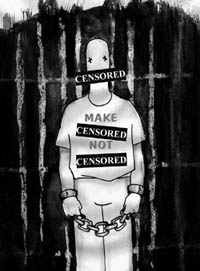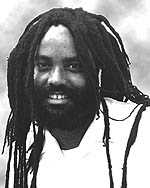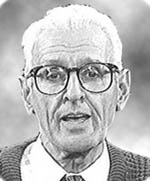 The story goes that Henry David Thoreau, the author of "Walden Pond" and other essays now on every high school reading list, sat in jail, imprisoned for protesting against an income tax, newly-enacted to finance a war. His friend Ralph Waldo Emerson came to visit him. Looking through the bars into Thoreau's cell, Emerson asked, "What are you doing in there, Henry?"
The story goes that Henry David Thoreau, the author of "Walden Pond" and other essays now on every high school reading list, sat in jail, imprisoned for protesting against an income tax, newly-enacted to finance a war. His friend Ralph Waldo Emerson came to visit him. Looking through the bars into Thoreau's cell, Emerson asked, "What are you doing in there, Henry?"
The better question, Thoreau replied, "is what are you doing out there?"
Civil disobedience has a long tradition in American history that begins with the Boston Tea Party. As the old cliché goes, it's as American as apple pie. Civil disobedience is the willful breaking of a law in order to protest that law. Cheating on your taxes is not civil disobedience; deliberately and publicly not paying your taxes--then going to jail for it--is. Smoking a joint is not civil disobedience, unless you do it on the courthouse steps.
Civil disobedience provided much of the fuel for the civil rights movement of the 1950s and 60s. Rosa Parks, for example, refused to move to the back of a bus in order to protest the Jim Crow laws. Countless "unruly Negroes" sat at "whites only" lunch counters, demanding service until the law showed up to arrest them.
Also in the 50s, Beat comic Lenny Bruce was arrested and briefly incarcerated for obscenity--for saying "fuck" in his standup routine. After the first episodes of police harassment, he deliberately used the word when cops showed up at his shows in order to get arrested and challenge the laws that forbade him to speak openly and freely.
Someone imprisoned for civil disobedience is, by definition, a political prisoner. Not all political prisoners are arrested for civil disobedience, however.
From the turn of the century until the postwar years, labor organizers were frequently targeted for harassment and arrest. They were often framed for crimes, or crimes were committed during demonstrations that deteriorated into violence. The violence was often caused by the goon squads and strike-busters that showed up to stop the demonstrations, but it was usually the pro-labor activist who was arrested and charged.
A political prisoner is someone who is imprisoned because of his or her political or religious views. When most Americans think of political prisoners, we think of IRA soldiers doing time in Irish jails; of Nelson Mandela imprisoned for his actions against apartheid; of ant-Communist Russians wasting away on the Gulag Archipelago; or of a South American anti-Fascist guerilla.
Most of us naively believe that in our country, with our protective Bill of Rights, being imprisoned for political reasons is virtually impossible. However, in spite of government denials, there are nearly 100 political prisoners in the U.S., and up to 150 according to some sources.

Mumia Abu-Jamal |
The most famous political prisoner in America today is Mumia Abu-Jamal. A Philadelphia journalist, Abu-Jamal hosted various radio shows. Because of his attacks on police brutality and corrupt local politicians, he lost his journalistic assignments and was forced to become a cab-driver. One of his attacks was aimed at the police harassment of MOVE, a radical black organization founded in the early 1970s. MOVE was known for wearing dreadlocks and their use of profanity during political speeches. |
In 1978, the police had surrounded the MOVE headquarters, an action that resulted in violence, including the death of a police officer. Abu-Jamal criticized the police actions.
While driving his cab on December 9, 1981, Abu-Jamal was arrested, beaten by police, and charged with the murder of a police officer. During his trail, prosecutors used his connections with the Black Panthers and other political actions to appeal to an all-white jury. He was tried and sentenced to die in the electric chair.
His appeals to the Pennsylvania Supreme Court have been repeatedly denied, in spite of the fact that the evidence does not link him to the death of the officer. The prosecutors relied on Abu-Jamal's writings when, as a teenager, he was involved with the Black Panthers. Abu-Jamal is scheduled to die this year; many think that due to Pennsylvania's conservative political climate, his appeals will continue to be denied and he'll be executed.

Jack Kevorkian |
Almost everyone in America has heard of Jack Kevorkian, the doctor of death who has publicly orchestrated dozens of assisted suicides. Kevorkian--and many other Americans--believe that when there is no hope for a cure for a painful disorder, a patient should have the right to terminate his or her own life. Unfortunately, the laws in most states disagree, and Kevorkian has been treated as a murderer. |
At one time, Kevorkian quietly went about the business of assisting patients to commit suicide in a painless, foolproof, medically-sound way. However, his work became public, and Kevorkian used that as an opportunity to publicize the injustice of the laws that allow government to interfere in our own decisions about whether or not to terminate a painful, hopeless life.
On April 12 of this year, the doctor was sentenced to 10-25 years for his "murderous" acts.
The controversy surrounding Kevorkian and his "suicide machine" is similar to what America underwent decades ago, when the rights of a family to terminate life support for a loved one was under debate. After similar acts of willfully breaking the law, court precedent finally helped change the laws that would have jailed the family member accused of such "mercy killing." The harder problem for Kevorkian, however, is that he has done more than simply "not support" a life--he assists in its termination.
The moral forces behind his conviction, however, are similar to those that denied the rights of family members to end life support, and they are related to those that oppose the rights to abortion. The arguments against Kevorkian come from a purely moralistic point of view, and the debate is over whether or not it is inherently "wrong" to terminate a human life--under any circumstances.
Without the moralistic arguments, there would be no legal support for jailing Kevorkian.

Leonard Peltier |
Leonard Peltier was a Native American activist who supposedly got into a shoot-out with the FBI's Cointelpro program. The program was notorious for planting informants in activist organizations; these informants would then disrupt their activities and even encourage them to break laws. Cointelpro had accumulated profiles on Martin Luther King, Black Panthers, and Native American groups. They had a profile on Peltier. |
A young Native American, he had been accused of stealing used cowboy boots, and two FBI agents entered the reservation to search for him. They spotted several men in a red pickup truck, which pulled over. Shots were fired, but it has never been established who fired first. The situation exploded into a firefight between over 30 Indians and over 150 FBI agents, Bureau of Indian Affairs police, U.S. marshals, and local police.
Within hours of the shootout, in which two agents and an Indian activist died, hundreds of military-equipped FBI agents and U.S. marshals staged a dragnet through the reservation, terrifying men, women and children and ransacking homes. Peltier had already been identified by Cointelpro as the leader of AIM (the American Indian Movement) and targeted for arrest. He fled to Canada.
With fabricated and flimsy evidence, Peltier was extradited, tried, and convicted. The government has admitted that the evidence is inconclusive, that witnesses were coerced, and that evidence of Peltier's innocence was suppressed, yet he still is serving time in prison.
Italian citizen Silvia Baraldini has been a radical activist since the 60s, when she protested against the war in Vietnam and racism, as well as demonstrated for women's rights. She also worked to expose Cointelpro and was an early supporter of the Black Panthers.
In 1994, Baraldini was charged with attempted robbery and aiding a prisoner escape. The robbery never took place; the prisoner was a jailed Black Panther leader. None of the crimes for which Baraldini was charged resulted in personal harm to anyone, yet she was convicted and sentenced to forty years, and received an additional three-year sentence for refusing to testify before a grand jury in an investigation of a Puerto Rican independence movement.
Since her conviction, Italy signed the Strasbourg Convention, officially petitioning for Baraldini's return. The U.S. has transferred thousands of prisoners to their homelands, due to the actions of the convention. However, Italy's appeals for Baraldini's return have been repeatedly denied.
The government takes civil disobedience and political action very seriously. One would think that, in a "free" society, an act of civil disobedience would result in the courts taking a fresh look at the law, evaluating its just-ness. One would also assume that the actions of political activists might cause the legislature to re-evaluate the conditions that they protest.
However, this is often not true. In many cases, an act of civil disobedience plunges enforcement authorities into a mad scramble to toughen the law under protest and close any loopholes. Kevorkian could probably have gotten away with his mission of mercy had he gone about it quietly. However, once he went public, he became a threat to the power structure, and once Sixty Minutes took a sympathetic look at him and his work, prosecutors seemed to feel forced to "make an example" of him.
Activism is most often met with resistance. If the resistance is unproductive, the activist is usually implicated in a crime which he or she did not commit. In some cases, such as in early infiltration efforts by the FBI of the Black Panthers, the intelligence-gatherers themselves may even cause violence. For example, one of Malcolm X's assassins admits that he was hired for that purpose by the FBI.
Political activism and civil disobedience are the bricks upon which our democracy is built. Popular vote is often not enough to ensure the protection of our rights as individuals--in fact, popular opinion often acts at the expense of the individual. The fact that a majority of Americans have voted to create a law does not mean that the law is just or "right."
The men who drafted our Constitution recognized this and added a set of amendments--the Bill of Rights. They wisely determined that it was as important to protect the rights of the individual in spite of the will of the majority. In California, for instance, a vote repealed affirmative action. Just because a popular vote ended affirmative action does not mean that the action was "right."
In many states, the efforts to preserve the rights of gays and lesbians have been voted down. The efforts of moralists have created ordinances banning onstage nudity, threatened the abortion-rights of women, and gotten publishers and cartoonists thrown in jail.
It is our duty as Americans to oppose actions that impinge on our own and others' civil rights, even if those actions are supported by popular opinion and the whim of the majority. Most of America's political prisoners are there for recognizing and exercising that duty.
Make an IMPACT
Email your feedback on this article to impact-press@mindspring.com.
Other articles by Morris Sullivan on this website:
MindPower columns by Patrick Scott Barnes:

 The story goes that Henry David Thoreau, the author of "Walden Pond" and other essays now on every high school reading list, sat in jail, imprisoned for protesting against an income tax, newly-enacted to finance a war. His friend Ralph Waldo Emerson came to visit him. Looking through the bars into Thoreau's cell, Emerson asked, "What are you doing in there, Henry?"
The story goes that Henry David Thoreau, the author of "Walden Pond" and other essays now on every high school reading list, sat in jail, imprisoned for protesting against an income tax, newly-enacted to finance a war. His friend Ralph Waldo Emerson came to visit him. Looking through the bars into Thoreau's cell, Emerson asked, "What are you doing in there, Henry?"


